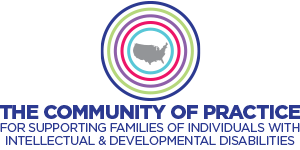2011 Agenda
Summit Families Summit 2011
In March of 2011, The Johnson Foundation’s Wingspread Family Support Summit brought together 30 national and state disability leaders to develop recommendations for policy reform to ensure families of people with I/DD receive the recognition and supports they need. Much of the work of supporting families since the Wingspread Family Support Summit has been driven by the key priorities established in the 2011 National Agenda for Supporting Families, elements of which have been adopted into state and national policy, funding, and practices.
Executive Summary
Families are the core unit in our society, serving as a source of support for all of its members. For individuals with intellectual and developmental disabilities (I/DD), the role of family is unique and often central in the support and care provided across the lifespan. Family members play key roles in identifying and securing opportunities for their family members to participate in meaningful ways within their community and ensuring access to self-determined lives. Parents and other family members of individuals with I/DD often provide medical, behavioral, financial, and other daily supports beyond what most families provide. Yet, the vital role of families is not fully recognized and supported in disability policy and practices.
Supporting individuals with intellectual and developmental disabilities to live and fully participate in their communities throughout their lives has emerged as a fundamental right and consideration in disability policy and practices. Because of the role that families continue to play in the lives of their family members with intellectual and developmental disabilities, future policies and practices must reflect the family as part of the system of support. This is especially important as the demands for services that support individuals with I/DD are increasing, while at the same time both state and federal funds are diminishing. This situation makes it critical for disability policies to acknowledge the family as a vital partner in supporting the individual to live in the community and to pursue independence, integration and full participation, and that policies and programs recognize both the individual within the context of the family and the needs of all the members.
To provide direction and guidance for such policy reform, a group of diverse national and state disability leaders met and developed recommendations on the types of supports families need to serve in this role, and made recommendations for advancing a national agenda on supporting the family at the Johnson Foundation’s Wingspread Conference Center in March 2011.
Priorities
Design the structure and functions of state service systems to include a focus on supporting families reflective of the fact that most people with I/DD are living with their families in the community.
Develop and fund National Supporting Family Initiatives that explore principles, practices, and data indicators that will inform practice and policy related to supporting families across the lifespan.
Develop a National Data Collection Initiative with consistent and uniform data to identify the impact on families and people with I/DD, and the cost-effectiveness of supporting families across local, state, and federal systems.
Elevate the recognition of the role of families and the need for supporting families within key Federal policies and national programs.
Recommendations
- Change the language and focus of the entire DD Act to address building an infrastructure within the community and supports to families so that individuals with intellectual and developmental disabilities are autonomous, resilient, and interdependent citizens, as opposed to only focusing on the direct service infrastructure.
- Reauthorize and strengthen supporting families under Title II of the DD Act- including funding for each state and accountability to measure outcomes.
- Link the language of the DD Act to the state DD service agency.
- Require the three DD Network Partners to collaborate in developing and funding family support initiatives in their state, similar to the self-advocacy mandate.
- Increase funding and Amend Part C of IDEA to move away from a medical model and instead focus on helping families develop a vision and expectations for their child and support the entire family.
- Amend Part D to require more accountability requirements on Parent Training Information Centers, place increased accountability requirements on schools related to transition and
- Strengthen transition provisions in the Elementary and Secondary Education Act (ESER), IDEA, Higher Education Act, and the reauthorization of the Rehabilitation Act.
- Increase funding for Parent to Parent (evidence-based model) programs and include Person-Centered Planning (PCP) as part of Parent to Parent so that PCP is provided by peers.
- Amend language in ESEA so that impact aid, which goes to the states and school districts with high poverty levels includes disability rates as a variable.
- Add a new provision to IDEA to fund Protection and Advocacy systems to focus even more attention on compliance regarding Part C and Part D of IDEA and the Rehabilitation Act.
- Ensure that the language covers families with members with I/DD and covers the needed time for leave for necessary care.
- FMLA should define family broadly, covering siblings and other family members who are primary caregivers for a family member with I/DD
- Increase funding for the Lifespan Respite Act and ensure that it is inclusive of families with members with I/DD across the lifespan.
A collaboration between the Community of Practice for Supporting Families, University of Missouri Kansas City Institute for Human Development (UMKC-IHD) and the National Association of State Directors of Developmental Disabilities Services (NASDDDS)




